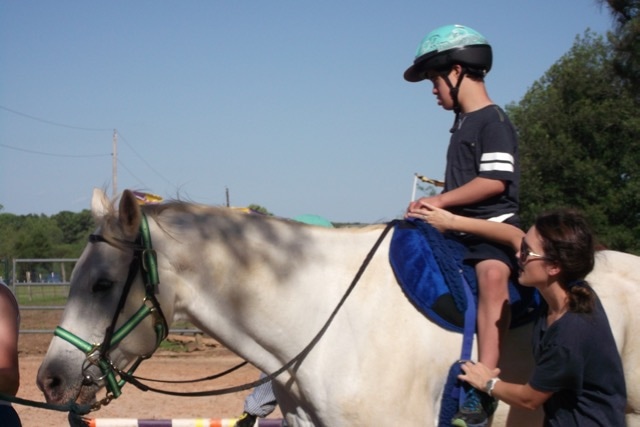Riding with Down Syndrome
Equine services are an effective tool for kids and adults with Down Syndrome. Equine services provides sensory stimulation to muscles and joints, impacts balance and movement sense detected by sensory receptors in the inner ear, and provides variable tactile experiences through the horse’s body heat, or when a client rubs, pats or hugs the horse, or feels the effects of the natural environment (sun/wind). Horse selection and environment are a critical factor in helping to facilitate increased muscle tone, and help the client to use their bodies effectively while astride.
Riders with Down Syndrome are often among the most talented and competitive students that our therapeutic riding program serves. Teaching horseback riding to students with Down Syndrome is a source of great joy and satisfaction, not only for the riders, but for the instructors and volunteers too.
While many clients present with hypotonia (low muscle tone) throughout the trunk and extremities, many higher functioning students with Down Syndrome soon learn to groom, tack up and ride their horse independently.
Regardless of riding ability, therapeutic riding will help students with Down syndrome develop memory, strength and coordination and instill self confidence while providing a fun and exciting non-typical therapeutic experience.
Prior to considering equine therapy for your child, it is important that they have current cervical x-rays to ensure the atlantoaxial joint (or C1-C2) is not at risk for dislocation. Head and neck movement Is a natural result of the three-dimensional movement of the horse’s walk and it is critical that this joint has appropriate strength and stability prior to evaluation.
If your child has Down Syndrome, and you think this may be an effective therapy, please don’t hesitate to call us at 903-401-9644.
Riders with Down Syndrome are often among the most talented and competitive students that our therapeutic riding program serves. Teaching horseback riding to students with Down Syndrome is a source of great joy and satisfaction, not only for the riders, but for the instructors and volunteers too.
While many clients present with hypotonia (low muscle tone) throughout the trunk and extremities, many higher functioning students with Down Syndrome soon learn to groom, tack up and ride their horse independently.
Regardless of riding ability, therapeutic riding will help students with Down syndrome develop memory, strength and coordination and instill self confidence while providing a fun and exciting non-typical therapeutic experience.
Prior to considering equine therapy for your child, it is important that they have current cervical x-rays to ensure the atlantoaxial joint (or C1-C2) is not at risk for dislocation. Head and neck movement Is a natural result of the three-dimensional movement of the horse’s walk and it is critical that this joint has appropriate strength and stability prior to evaluation.
If your child has Down Syndrome, and you think this may be an effective therapy, please don’t hesitate to call us at 903-401-9644.
